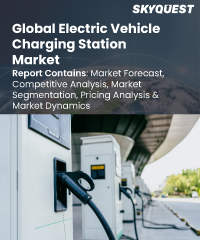
Product ID: SQMIG25C2091

Report ID:
SQMIG25C2091 |
Region:
Global |
Published Date: February, 2024
Pages:
165
|
Tables:
144 |
Figures:
78
Electric Vehicle Charging Station Market Driver
Significant Investment in Electric Vehicles to Boost Market Growth
Electric Vehicle Charging Station Market Restrains
Lack of Infrastructure to Hinder Market Growth
Our industry expert will work with you to provide you with customized data in a short amount of time.
REQUEST FREE CUSTOMIZATIONElectric Vehicle Charging Station Market size was valued at USD 35.2 billion in 2019 and is poised to grow from USD 46.4 billion in 2023 to USD 417.35 billion by 2031, growing at a CAGR of 31.5% in the forecast period (2024-2031).
Want to customize this report? This report can be personalized according to your needs. Our analysts and industry experts will work directly with you to understand your requirements and provide you with customized data in a short amount of time. We offer $1000 worth of FREE customization at the time of purchase.

Product ID: SQMIG25C2091